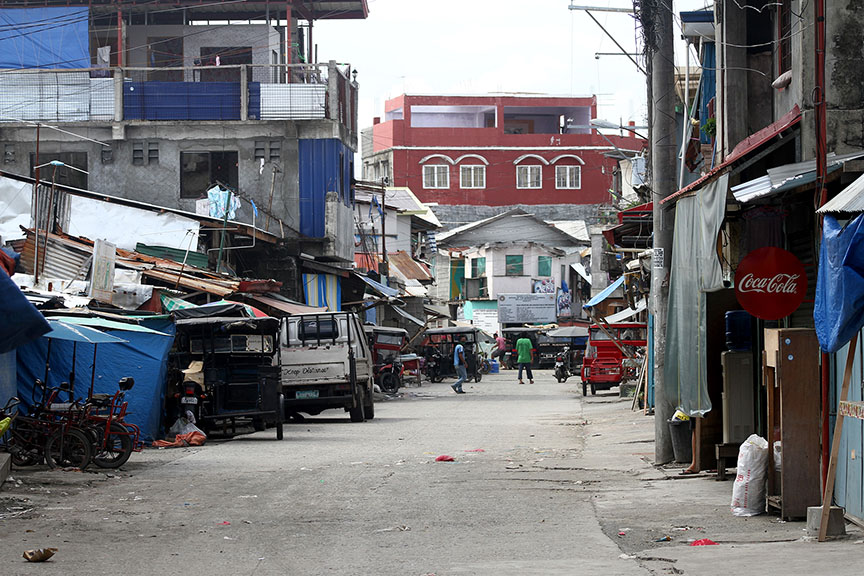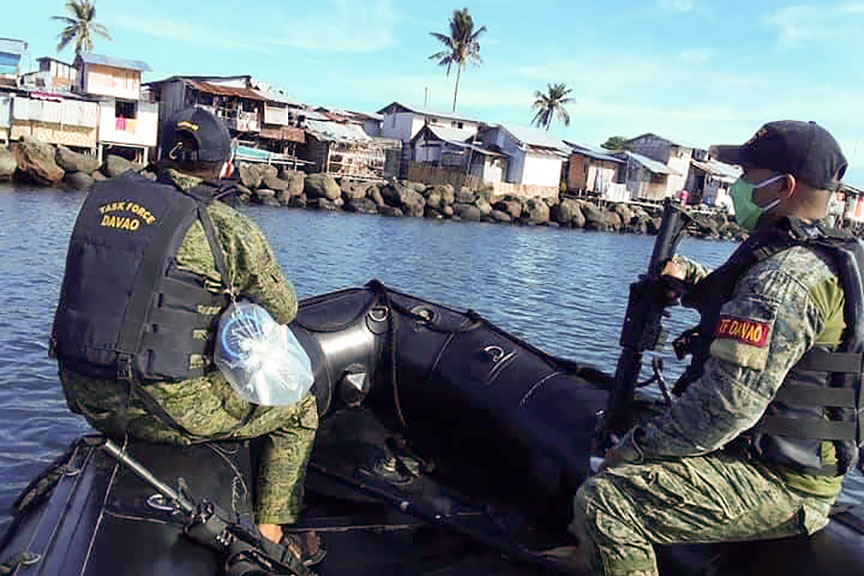DAVAO CITY (MindaNews) – Mayor Sara Duterte said the city government of Davao decided to place the entire Barangay 23-C in Davao City under 14-day “hard lockdown” effective last Saturday because she does not want the entire city to revert back to enhanced community quarantine (ECQ).
 This is usually a busy street leading to the coastal area of Barangay 23-C in Davao City, but is now almost deserted in this photo taken Monday (6 July 2020) with the 14-day “hard lockdown” imposed by the city government because of the surge of cases in the village. MindaNews photo
This is usually a busy street leading to the coastal area of Barangay 23-C in Davao City, but is now almost deserted in this photo taken Monday (6 July 2020) with the 14-day “hard lockdown” imposed by the city government because of the surge of cases in the village. MindaNews photo
She said in her interview over Davao City Disaster Radio (DCDR 87.5) that the “hard lockdown,” described practically to be “more restrictive” than ECQ, was enforced to contain the transmission of coronavirus disease (COVID-19) as the densely populated barangay continued to see rising confirmed cases, which is now at 88.
Barangay 23-C has an estimated population of 18,000.
Duterte said she does not want the infections to spillover to unaffected barangays.
“We don’t want other barangays to be affected. We have 182 barangays. We don’t want just because of one barangay, we will go back to ECQ,” she said.
The entire city was placed under ECQ from April 4 to May 15, general community quarantine from May 16 until June 30, and modified general community quarantine effective July 1.
Duterte said residents in Barangay 23-C are prohibited to leave their houses during the lockdown, even for buying food and medicines.
The City Social Welfare and Development Office (CSWDO), City Agriculturist Office (CAO), and City Health Office will provide food and medicines, she said.
“Our CSWDO will ensure that all families within this barangay would be provided with food such as rice and grocery items, particularly canned goods, while our [CAO] responded by providing vegetables,” she said.
 Patrolling the shoreline of Barangay 23-C in Davao City. File photo courtesy of Task Force Davao
Patrolling the shoreline of Barangay 23-C in Davao City. File photo courtesy of Task Force Davao
The mayor said the only time residents are permitted to go outside is when they need to go to the hospital or see a doctor while workers would be issued with a certification from the local government as proof that they could not report for work due to lockdown.
She said barangays officials admitted they found it difficult to make the residents follow the basic health protocols like wearing of face masks once no one is watching over them.
Also, Duterte said the heads of the families would be employed through “Work for Davao” as an intervention of the city government to cushion the effect on their livelihood.
“Out intervention for the Work For Davao for Barangay 23-C are for the heads of the families. They are our beneficiaries because we see them as mature enough, the ones with authority, to reprimand those who are not wearing mask, tell others to wash their hands, and ask people to stay indoors,” she said.
She said they expect zero new cases after 14 days through reverse transcription-polymerase chain reaction (RT-PCR) tests and warned to extend the hard lockdown for another 14 days if there would still be new cases.
“After 28 days, if there will still be cases, there will be a reassessment in the community,” she said.
Duterte said she hopes Barangay 23-C would set an example of what would likely happen if COVID-19 cases would increase in other barangays of the city.
From June 28 to July 3, Barangay 23-C reported 17 new COVID-19 cases. Since the outbreak began, Barangay 23-C, classified as “hot spot” and “very high risk” areas, recorded a total of 88 cases, with two deaths.
“I want Dabawenyos to understand why we need to put Barangay 23-C under lockdown, that’s because our doctors saw that the transmission in that area was very fast. There are so many confirmed COVID-19 cases there. What we don’t want to happen is for the infected individuals to infect others when they go out of this barangay, and spread the infections in our city,” she said.
She said residents in Barangay 23-C had already anticipated being placed under lockdown. (Antonio L. Colina IV / MindaNews)
